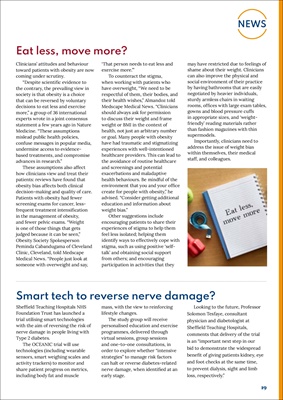
19
NEWS
Eat less, move more?
Clinicians' attitudes and behaviour
toward patients with obesity are now
coming under scrutiny.
"Despite scientific evidence to
the contrary, the prevailing view in
society is that obesity is a choice
that can be reversed by voluntary
decisions to eat less and exercise
more," a group of 36 international
experts wrote in a joint consensus
statement a few years ago in Nature
Medicine. "These assumptions
mislead public health policies,
confuse messages in popular media,
undermine access to evidencebased
treatments, and compromise
advances in research."
These assumptions also affect
how clinicians view and treat their
patients: reviews have found that
obesity bias affects both clinical
decision-making and quality of care.
Patients with obesity had fewer
screening exams for cancer, lessfrequent
treatment intensification
in the management of obesity,
and fewer pelvic exams. "Weight
is one of those things that gets
judged because it can be seen,"
Obesity Society Spokesperson
Peminda Cabandugama of Cleveland
Clinic, Cleveland, told Medscape
Medical News. "People just look at
someone with overweight and say,
'That person needs to eat less and
exercise more.'"
To counteract the stigma,
when working with patients who
have overweight, "We need to be
respectful of them, their bodies, and
their health wishes," Almandoz told
Medscape Medical News. "Clinicians
should always ask for permission
to discuss their weight and frame
weight or BMI in the context of
health, not just an arbitrary number
or goal. Many people with obesity
have had traumatic and stigmatizing
experiences with well-intentioned
healthcare providers. This can lead to
the avoidance of routine healthcare
and screenings and potential
exacerbations and maladaptive
health behaviours. Be mindful of the
environment that you and your office
create for people with obesity," he
advised. "Consider getting additional
education and information about
weight bias."
Other suggestions include
encouraging patients to share their
experiences of stigma to help them
feel less isolated; helping them
identify ways to effectively cope with
stigma, such as using positive 'selftalk' and obtaining social support
from others; and encouraging
participation in activities that they
may have restricted due to feelings of
shame about their weight. Clinicians
can also improve the physical and
social environment of their practice
by having bathrooms that are easily
negotiated by heavier individuals,
sturdy armless chairs in waiting
rooms, offices with large exam tables,
gowns and blood pressure cuffs
in appropriate sizes, and 'weightfriendly'
reading materials rather
than fashion magazines with thin
supermodels.
Importantly, clinicians need to
address the issue of weight bias
within themselves, their medical
staff, and colleagues.
Smart tech to reverse nerve damage?
Sheffield Teaching Hospitals NHS
Foundation Trust has launched a
trial utilising smart technologies
with the aim of reversing the risk of
nerve damage in people living with
Type 2 diabetes.
The OCEANIC trial will use
technologies (including wearable
sensors, smart weighing scales and
activity trackers) to monitor and
share patient progress on metrics,
including body fat and muscle
mass, with the view to reinforcing
lifestyle changes.
The study group will receive
personalised education and exercise
programmes, delivered through
virtual sessions, group sessions
and one-to-one consultations, in
order to explore whether "intensive
strategies" to manage risk factors
can halt or reverse diabetes-related
nerve damage, when identified at an
early stage.
Looking to the future, Professor
Solomon Tesfaye, consultant
physician and diabetologist at
Sheffield Teaching Hospitals,
comments that delivery of the trial
is an "important next step in our
bid to demonstrate the widespread
benefit of giving patients kidney, eye
and foot checks at the same time,
to prevent dialysis, sight and limb
loss, respectively."